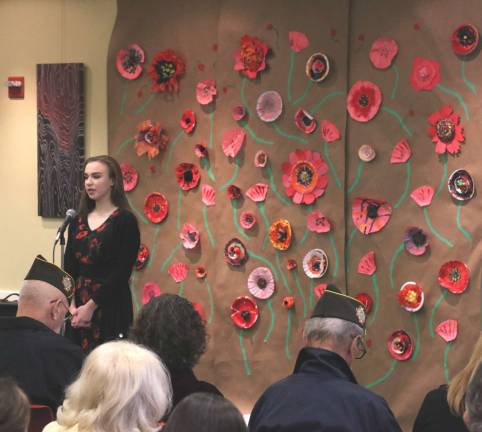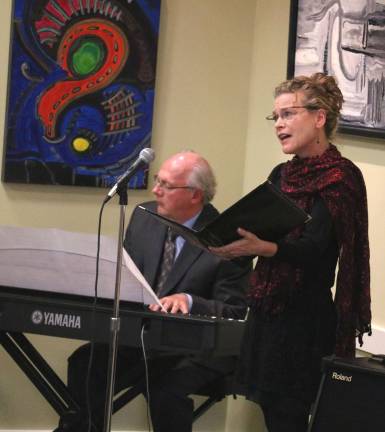Albert Wisner Public Library hosts Remembering the Armistice


WARWICK — This year marks the 100th anniversary of the Armistice, signed on Nov. 11, 1918, between the Allies of World War I and Germany for the cessation of hostilities on the Western Front.
A formal peace agreement, however, was only reached when the Treaty of Versailles was signed the following year.
On Sunday, Nov. 4, the Albert Wisner Public Library hosted a well attended event titled, "Remembering the Armistice," featuring a program of music, history and poetry associated with the First World War.
After welcoming the guests and extending her many thanks to those who participated, Kathleen Georgalas, assistant to the library director, introduced Fleur Kuhta, who read the famous poem by John McCrae, "In Flanders Field."
As many will recall, it begins, "In Flanders Fields the poppies blow, between the crosses, row on row," and concludes with, "If ye break the faith with us who die, we shall not sleep, though poppies grow in Flanders fields."
Those poppies are still a symbol of the First World War and served as a backdrop for the library event.
Dr. Richard Hull, retired New York University Professor of History and Town of Warwick historian, then spoke about the effects of World War II and how America changed.
Residents of small towns like Warwick, he explained, who had never traveled and were seldom made aware of the world outside, returned from France.
And with many of the men serving in the military during the war, the woman were left to run things. Hull believes that soon led to the 19th Amendment, which gave woman the right to vote.
He went on to mention numerous changes in the culture and laws of the nation and the world including the rise of Nationalism with America becoming a world power. There was also more federal intervention, more education, and the economic boom known as, "The Roaring Twenties."
On the down side, men has been killed or wounded, and many of the returning veterans, including Warwickians, suffered from shell shock and the effects of gas attacks.
And there was the deadly pandemic known as the "Spanish Flu," which returning troops may have brought back and which killed over 500,000 Americans.
The Remembering the Armistice program continued with more poetry and beautiful songs, a letter from Pvt. Winthrop Sanford, readings of the names of those Warwick citizens who served and an Americana Medley performed by the Jubilate Choir.
One especially moving poem, Christmas 1914, by Donna Spector, told the story of an impromptu and unauthorized halt in hostilities, "a moment of peace" by British and German troops, where young enemy soldiers celebrated and played soccer on Christmas in 1914.
The poem ends with the hope that, "we will finally and forever be at peace."
- Roger Gavan